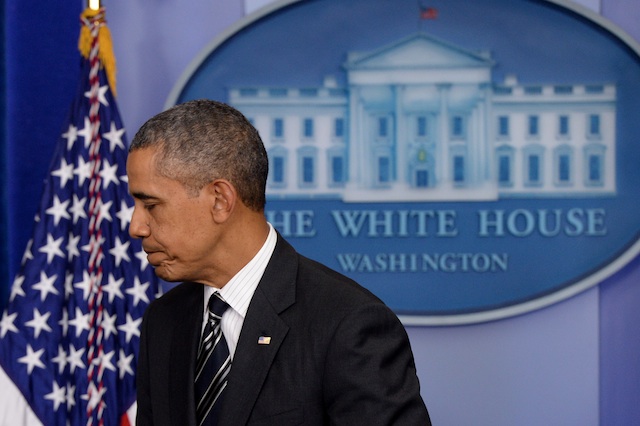SUMMARY
This is AI generated summarization, which may have errors. For context, always refer to the full article.

WASHINGTON, USA – A review panel handed President Barack Obama a report Friday (Saturday, December 14 in the Philippines) on surveillance by US spy agencies following explosive revelations on vast phone and Internet sweeps by fugitive Edward Snowden.
The report contains more than 40 recommendations the White House will consider, and Obama will deliver a speech on the subject after a full-scale review of US eavesdropping activity concludes in January, National Security Council spokeswoman Caitlin Hayden said.
The report is said to recommend a continuation of National Security Agency (NSA) surveillance programs, which have alarmed US allies and civil liberties groups, but with some new privacy safeguards.
The White House will study the five-man panel’s work and decide which recommendations to adopt, which need further study, and which to discarded.
National security, public trust
The report looks at how Washington can use its intelligence capability to guard national security while maintaining public trust.
Obama said last week that he would introduce some restraints on the NSA following the review.
A flurry of intelligence leaks from Snowden, currently in temporary asylum in Russia, lifted the lid on a vast global spying network.
Tens of thousands of documents leaked by Snowden to The Guardian newspaper and other media outlets have detailed the scope of the NSA’s shadowy activities.
Snowden’s revelations show that the NSA has systematically raked in metadata and information from millions of emails and phone calls, some of it about US citizens.
The leaks have provided a rolling embarrassment for the White House and damaged US national security, while the scale of the eavesdropping has shocked and angered US allies.
‘Information gathering appropriate’
US Secretary of State John Kerry, in excerpts of an interview to be aired Sunday, said he could guarantee that “neither the president nor I believe that some of this gathering of information that has taken place in very particular instances and against particular high-level personnel is appropriate.”
“I think the president will speak to that very clearly in the days ahead,” he told Andres Oppenheimer of CNN en Espanol.
The New York Times reported that the review panel would recommend making public the privacy protections foreign citizens can expect when the NSA gathers their phone or Internet records.
Separately, a US official said the White House had also decided to maintain the “dual-hatted” arrangement that sees a single military officer head the NSA eavesdropping service and US cyberwarfare operations.
The Wall Street Journal, meanwhile, said the task force would recommend that records of phone calls held by the NSA after the massive data mining operations should be held by telephone companies and not the spy agency.
The Times reported that the review panel would recommend that top White House officials directly examine the list of foreign leaders whose communications are monitored by the NSA.
The protection will be introduced following revelations that US spies eavesdropped on the mobile phone of German Chancellor Angela Merkel and the communications of other world leaders.
The Times also said that the White House review would create a corps of lawyers who would argue against NSA attorneys over espionage operations in the existing Foreign Intelligence Surveillance Court.
White House officials declined to comment on the reports.
Too much power?
Some critics of the “dual-hatted” system of leadership for the NSA and the military’s cyberwarfare command had argued the arrangement puts too much power in the hands of one person.
But Hayden said that after an interagency review, the administration decided that keeping the positions of NSA director and Cyber Command commander together as one was the most effective way to run both agencies.
“NSA plays a unique role in supporting Cyber Command’s mission, providing critical support for target access and development, including linguists, analysts, cryptanalytic capabilities and sophisticated technological infrastructure,” Hayden said.
In practice, the decision means that the NSA will continue to be headed by a military officer – as the head of Cyber Command will of necessity be a senior member of the armed services.
The current head of the two agencies, four-star General Keith Alexander, retires early next year.
Civil rights groups have decried the NSA’s activities as the actions of a Big Brother-like government, trampling on the rights of individuals with little oversight.
The American Civil Liberties Union said that “nothing short of stopping the mass, suspicionless surveillance of Americans is acceptable.”
The New America Foundation’s Open Technology Institute said the reports indicated some reforms were in the pipeline, but expressed disappointment at the expected wider findings for the panel.
“Mandating that phone companies or a third party retain years’ worth of phone data just in case the government wants to look at it is not an ‘overhaul’ of or an ‘end’ to the NSA’s bulk collection program, as some reports have described it,” said OTI Policy Director Kevin Bankston. –Rappler.com
Add a comment
How does this make you feel?
There are no comments yet. Add your comment to start the conversation.